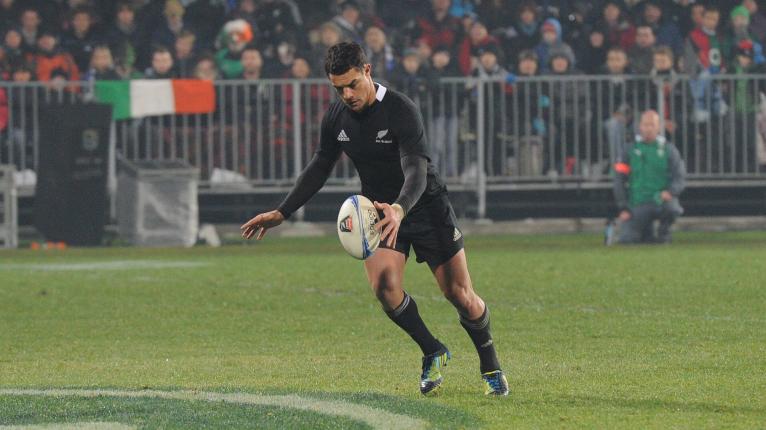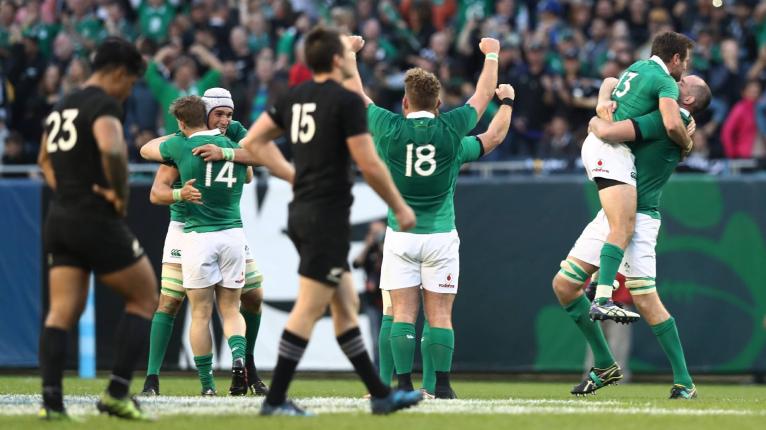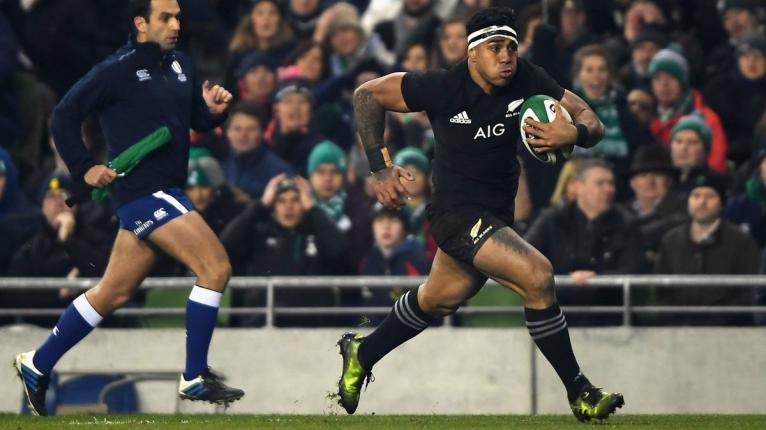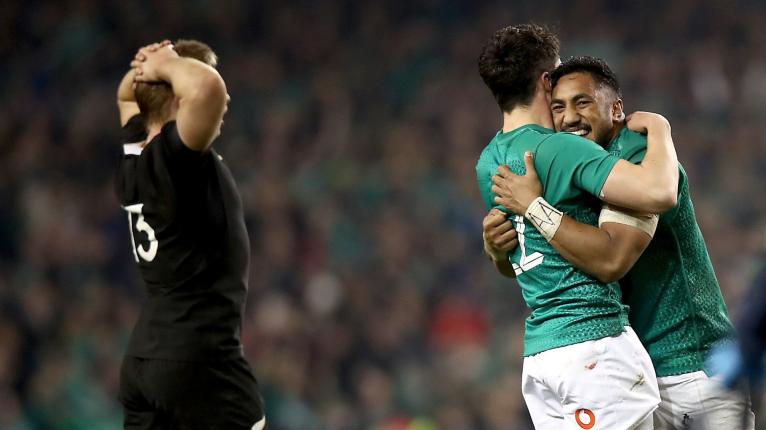There are different views on when exactly it was that Ireland truly earned the respect of the All Blacks. Some say it was when Ireland, having been well beaten in the first of a three-test series in 2012, came within a minute the following week of snatching a famous draw in Christchurch.
On a freezing night in the South Island, Ireland spent large periods of the test dominating the All Blacks in all the areas that mattered and were on track to keep the series alive at 19-all, until Dan Carter dropped a goal in the 79th minute.
The fact that the All Blacks won 60-0 in the third test is why some say that respect for the Irish didn’t manifest until the following year, when they went even closer to a famous win in Dublin.
Who could ever forget that Ireland were just 32 seconds away from an historic first victory that day in November 2013, only for the All Blacks to produce the greatest passage of pressure rugby ever seen to conjure a miracle try long after the final whistle.
The majority of analysts say, however, that it was two years later in Chicago that the Irish crossed the threshold and became an opponent that the All Blacks stopped seeing as a team of nearly-men and instead one with enough resilience, determination and rugby intelligence to actually win the biggest games.

After 111 years of trying, Ireland finally bagged the win they had craved at Soldier Field. While they saw their 30-8 lead whittled back to 33-29, this was the game in which they found a way to regroup, compose themselves and conjure one last try to get the job done.
It’s not that the All Blacks didn’t rate Ireland before 2016, but there’s respect and then there is real respect – the kind that is reserved for those opponents who have actually beaten them.
The All Blacks didn’t have that for Ireland in Chicago, but they did two weeks later when they met in Dublin.
International scheduling is a lottery and in 2016 it hit the jackpot as the All Blacks, having arranged the first test against Ireland outside the test window in early November, had long been due to meet them as part of the usual rotation in mid-November.
Funnily enough, just as is the case this year, the All Blacks first had to play against Italy in Rome and then head to Dublin for the chance to exact their revenge.
They had become the first All Blacks team in history to lose a test to the Irish and as much as that was down to the brilliance of the men in the green on the day, it was also partly due to an opening 50 minutes by New Zealand that was devoid of accuracy and physicality.
That second test against Ireland should be seen as the exact moment in time that the rugby relationship between the two nations changed. The All Blacks were hurt by that loss in Chicago more than they would ever let on.
They had become the first All Blacks team in history to lose a test to the Irish and as much as that was down to the brilliance of the men in the green on the day, it was also partly due to an opening 50 minutes by New Zealand that was devoid of accuracy and physicality.
Ireland beat them up across the park in the USA and for two weeks, the All Blacks stewed about that, and wound themselves up into quite the state about it all.
Sam Whitelock and Brodie Retallick, who had missed the first test with injury, returned to the second row for the re-match and on the Monday six days before kick-off, the team reviewed their performance in Chicago.
“What sticks out about this review, is there was a bit of embarrassment from us when you see some of the footy,” flanker and now captain Sam Cane said that night. “And you see that’s not what we are about, that’s pretty poor footy. There was certainly an uncomfortable feel in the room which was good.”

Just how uncomfortable the All Blacks had been watching themselves be shredded by Ireland became apparent in the first 10 minutes of the Dublin re-match. Even five years on, people wince just thinking about how intensely brutal that game was.
The All Blacks played with a newfound respect for Ireland and it came out almost as blind rage. The collisions were ferocious and relentless. Bodies flew into every contact and the carnage was memorable. The blood flowed, literally, the medical staff were on the field every breakdown and both teams simply refused to back down.
Ireland responded with a similar ferocity and it would be hard to recall a test in the last decade that had the same level of intensity.
There were two incidents, however, that skewed the perception of the home fans, nudged them towards seeing the All Blacks as dirty and cynical rather than tough and committed.
A head collision between Sam Cane and Gary Ringrose saw the latter carried off, bleeding and confused after 10 minutes. The crowd howled for a red card, but referee Jaco Peyper decided it was accidental, which the judicial hearing backed that call after the game.
When the game ended, no one in Ireland felt that what they had seen was the All Blacks treat them with respect. There was only a sense of aggrievement, reflected in the way RTE broadcaster Clare McNamara questioned All Blacks coach Steve Hansen immediately after the game.
And with 25 minutes to go Malakai Fekitoa was yellow-carded for a high tackle on Simon Zebo. It met the threshold for red according to the post-match judicial review and not only were Ireland denied the chance to play against 14 men, Fekitoa came back after his 10 minutes in the bin to score another try and push the All Blacks to an unassailable 21-9 lead.
When the game ended, no one in Ireland felt that what they had seen was the All Blacks treat them with respect. There was only a sense of aggrievement, reflected in the way RTE broadcaster Clare McNamara questioned All Blacks coach Steve Hansen immediately after the game.
She asked him three times about the way the All Blacks had been tackling and whether he was concerned by it. Hansen was less than impressed: “I’m not sure where you’re going with this, do you want me to tell you we’re a dirty side or something? Is that what you’re saying?”. When McNamara said no, Hansen said: “Well, do you want to talk about something else now?”.
But Hansen’s prickliness was driven by his concern that his team had indeed been gripped by rage when he had been looking for discipline and control. “That game in Dublin was simply a reaction to Chicago,” says Wayne Smith, the All Blacks defence coach that day in Dublin.
“We had just set a world record of 18 test wins in a row and there was absolutely no doubt that in Chicago there wasn’t the same intensity in the build-up. We took our eye off the ball a wee bit and it hurt and if you look back now, we could have set the winning streak at 23 or 24 if we had won that game.
“But we didn’t and so that Dublin test there was a heightened sense of revenge. I think we made 283 tackles and that is the most I’ve ever been involved with and they were brutal.”

It was a view shared by Cane, who a couple of months later would say: “We went out there and really tried to bash them and we ended up making so many tackles and played the game that way. It was a gutsy win.
“What I learned from that is we don’t want to go out there and bash them. Use our skillset, some of our game management things we learned and play smart as well as physical.”
It may have been rage, but it was anger driven by respect and while it may not console the Irish, they should at least realise that the All Blacks don’t feel the need to play with that sort of ferocity against the likes of Australia and Wales.
Two years later, the All Blacks were back in Dublin and hopeful that they would be able to show they had learned the art of being physical while not at the expense of their creativity.
In trying to strike that balance, they failed to find enough of either quality and lost 16-9 – a defeat that amplified their respect for Ireland. That game hurt them more than any other defeat in Hansen’s coaching era which spanned from 2012 to 2019.
That’s why the World Cup quarter-final clash between the two was such an emotional game for the All Blacks. The occasion didn’t need any help given what was at stake, but the All Blacks were driven as much that week by avenging the loss in November 2018 as they were by the goal of making it to the semi-final.
They came away from the Aviva Stadium feeling like Ireland had simply outplayed them, had been smarter and more organised. They came away wondering whether Ireland were in fact the better team and that the tables had turned to such an extent that they were the ones struggling to be respected.
That’s why the World Cup quarter-final clash between the two was such an emotional game for the All Blacks. The occasion didn’t need any help given what was at stake, but the All Blacks were driven as much that week by avenging the loss in November 2018 as they were by the goal of making it to the semi-final.
They wanted to show Ireland how much they had developed since they had last met and they were supercharged for that match in Yokohama. When Aaron Smith scored the first try after 10 minutes, his reaction showed how much it meant. Even Beauden Barrett reacted to his try after half an hour with a dramatic punch of the ball into the crowd.
Speaking just hours after the All Blacks had arrived in Dublin for their 2021 encounter, Dane Coles put the relationship with Ireland into context.

“It’s funny, you always think about the ones you have lost. In the last five years they’ve always been down to the wire and could have gone either way apart from the World Cup when we were hurting from previous results.
“They had a great win in the weekend [against Japan] so I expect another tight tussle. They’re a different beast at home.
“They’ll be feeding off a full stadium so it’s a great challenge for us. I remember last time over here that we lost they just kept turning up, it seemed like there was no space for us to attack. That was the one thing that stood out for me.
“They put some big shots on and put us under pressure. We may have played a bit too much footy so the kicking game might come into it.”
A genuine rivalry has erupted between the All Blacks and Ireland, the beginnings of which can be traced back to a freezing night in Christchurch in 2012, through to the classic encounter in Dublin in 2013 and then to Chicago and Dublin in 2016 where the respect levels changed.
The two sides will meet again three times in New Zealand next year and no matter the result of the test in 2021 or the series in 2022, Ireland can at least be sure they have genuinely earned the respect of the All Blacks.



Comments
Join free and tell us what you really think!
Sign up for free